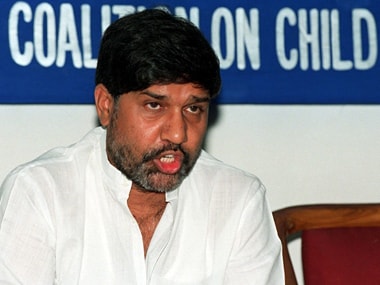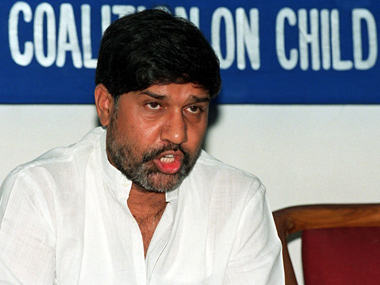“Hum Azad hain! (We are free!)” chants 2014 Nobel Prize Winner Kailash Satyarthi. Echoing his voice are hoards of children who were enslaved and abused at an age when they should have been fighting over hide and seek rules. Finally rescued from a damned life, Satyarthi says every time they yelled out, they got some of their confidence back. Satyarthi’s fight to ensure that every child is able control his or her destiny began in 1980. In over three decades, Satyarthi and his organisation Bachpan Bachao Andolan have rescued close to 80,000 children who have been forced into labour or exploited sexually. [caption id=“attachment_1751129” align=“alignleft” width=“380”]
 Kailash Satyarthi in a file photo. Reuters[/caption] The scene above is from a PBS documentary that celebrates unsung heroes such as Satyarthi, who work in silence to push for social justice and equality for innocent children who are exploited and forced to lead dehumanising lives. “Education is the key to liberation. Education is key to empowerment. Education is the key to prosperity for the future. So education is on top of everything,” Satyarthi says while surrounded by children he has rescued, and taken to a village that has become a halfway home for them. The village in question is one of the many facilities Satyarthi and BBA run. As the Nobel committee felicitated Satyarthi today, here is getting to know him and his work better:
Kailash Satyarthi in a file photo. Reuters[/caption] The scene above is from a PBS documentary that celebrates unsung heroes such as Satyarthi, who work in silence to push for social justice and equality for innocent children who are exploited and forced to lead dehumanising lives. “Education is the key to liberation. Education is key to empowerment. Education is the key to prosperity for the future. So education is on top of everything,” Satyarthi says while surrounded by children he has rescued, and taken to a village that has become a halfway home for them. The village in question is one of the many facilities Satyarthi and BBA run. As the Nobel committee felicitated Satyarthi today, here is getting to know him and his work better:
The PBS docuemntary shows a rescue operation led by Satyarthi from the beginning till the end. Watch the Nobel laurette in action as he rescues children and their families, who continue to be enslaved like in medieval times.
Addressing the audience at a TED conference at IIT Kharakpur, Satyarthi’s talk is both inspriting and heart wrenching, as he narrates tale after tale of rescued children and their circumstances.
Speaking at a conference called ‘Sustainable Elimination of Child Labour: a global challenge,’ Satyarthi speaks of the struggles facing children across the world and why assuring rights of children ought to be a global effort. “Personally speaking, whenever I get a report of reduction of child labour - now after each four years - it heals my wounds and my injuries, which I have got several times while rescuing slave children in my country, India. It heals me,” he says
Satyarthi’s address at the University of Michigan in 2002 came after the university awarded him the Wallenberg Medal for his contribution to the world. Satyarthi speaks slowly and falteringly as the audience is gripped by stories of how children are treated and where the global response has failed. “One can say that it is the poverty, but this is not true. Who is responsible for poverty if the poverty is responsible for child labor? Are the children responsible? Are the sinners? Is it their mistake? No, we adults, our policies, our ways of governance, are responsible for poverty, not the children. So why they should be a victim of something, which is not their sin? That is also not true. We talk of globalization, and how much money is needed for the education of children in the world, their liberation and rehabilitation just $9 billion which is four days of military expense. Just four days. Nine billion dollars is nothing. But what Americans spent on ice cream just 20 percent of this. One fifth of what you spend on ice creams could bring the children out of the clutches of their masters and put them to school,” he said in a powerful address.
)